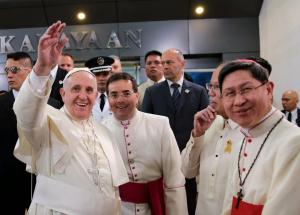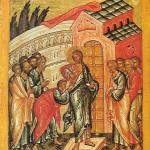
Many Catholics are finding themselves having a crisis of faith. Some valiantly hold on to what faith they still possesses, while others, for many different reasons, find it is too hard to do so, and give up, hoping to find peace elsewhere. Looking at what is going on within so many Catholic communities, it is not difficult to understand why many find themselves so conflicted in their faith that they come to conclude that the only solution is for them to leave what is giving them so much turmoil. Those who remain, either because they do not experience such conflicts within their own spiritual life, or because they find a way to remain Catholic despite what troubles them, should not look down upon those who find it difficult to remain. They should try to understand the problems which have led people to leave the faith, and see what they can do to comfort them, to make things better. Obviously, they cannot do everything themselves, but what they can do, and should do, is show compassion to everyone, for it is often that lack of compassion which is at the heart of many conflicts within the church today.
Many of the difficulties the church faces today come from those who serve as its chief representatives, that is, the clergy and bishops who hold positions of authority and power in the church. We see this in the way many bishops and clergy have either ignored or done things which worsened the sexual abuse crisis in the church. Similarly, too many bishops, too many clergy, are so concerned about their position of authority and power, they use what they have, not for the sake of the church and her continuing mission in the church, but for their own particular interests and desires; in doing so, they end up dividing the church. We can find happening, for examples, with those clergy associated with the Napa Institute. They are not using their authority to help the faithful in their own spiritual lives, but rather, they coordinate actions which will reinforce their what their particular, and often dangerous, ideology desires. The faithful, who notices, will learn to disregard, if not disrespect, the clergy who do this, leading them to likewise question the hierarchy of the church in general.
While far from perfect, as he himself acknowledges, Pope Francis nonetheless has served as a beacon of light to many, as he recognizes and speaks against the problems of clericalism, and the ideologies which many clergy engage which run contrary to the church’s own mission in the world. Pope Francis is also working to change things within the church, to make them better, hoping that being doing so, those who felt like they had to leave the church might come back, but also, so that those who are not yet Christians will see the truth of the Catholic faith in action and find it so attractive, they will want to experience the peace of Christ for themselves. This is why Pope Francis stands in stark contrast to many others within the hierarchy, especially those currently in leadership positions in the United States Conference of Catholic Bishops. Pope Francis consistently points out our spiritual practices must properly engage society and its needs, instead of merely putting on a triumphalistic show, while it seems the United States Conference of Bishops (USCCB) in its so-called “Eucharistic Revival” seem to focus on putting on a show of piety and using the eucharist for the sake of their own ideological desires.
Pope Francis, instead of having us become so self-focused and narcissistic, would have us look to the way we can encounter Christ, and bring Christ with us into the world. He says that the way forward is to engage the world with love, a love which includes a desire for justice for all. This way, we will focus, not on our wants and desires, not on our self-interest, but on Christ:
But again we must ask ourselves: do we have a spirituality truly capable of interpreting the season – now long and widespread – of this time of our weakness entrusted to others, that is greater than to the power of our autonomy? How do we remain faithful to the lived act of following [Jesus], to the promised love, to the justice sought in the time of our capacity for initiative, in the time of the fragility, in the time of dependence, of farewell, in the time of moving away from being the protagonist of our lives? It’s not easy, is it? To move away from being the protagonist. It’s not easy.[1]
We must embrace Jesus; we must embrace the path of love, the path which Jesus set up. This means, we must focus on the needs of people today, the needs of our present age, and not the needs and interests of those in the past. That is, we should not try to fill old wine skins with new wine. We must stop thinking the way things were done in the past necessarily fit with what is needed today. Acts of faith, hope, and love are important, but we must make sure we do them out of faith and devotion to Christ, and not as an act of piety-signaling, for if put the focus on ourselves, we will not be able to bring about the revival our church needs today:
We can ask ourselves: are we capable of preserving the tenor of this relationship of Jesus with the disciples, according to his style that is so open, so frank, so direct, so humanly real? How is our relationship with Jesus? Is it like this, like that of the Apostles with Him? Are we not, instead, very often tempted to enclose the testimony of the Gospel in the cocoon of a ‘sugar-coated’ revelation, to which is added our own circumstantial veneration? This attitude, which seems respectful, actually distances us from the real Jesus, and even becomes the occasion for a very abstract, very self-referential, very worldly journey of faith, which is not the path of Jesus. Jesus is the Word of God made man, and He comports Himself as man, He speaks to us as man, God-man. With this tenderness, with this friendship, with this closeness. Jesus is not like the sugar-sweet image of the picture cards, no: Jesus is close to hand, he is near us. [2]
Pope Francis tells us that we need to engage Jesus for ourselves, to come to know Jesus, not through mere theory, but in actuality; we must engage Jesus, not through the pietistic representations which hide the real face of Jesus, but through the real Jesus, the one who is close at hand with us and everyone, the one who is working in and with us for the transformation of the world. Jesus promoted the way of love, and with it, the need to work for justice for those who have been unjustly oppressed. He fought against the structures of sin in the world, and indeed, his victory over death is his victory over those structures, and if we are to know Jesus, if we are to work with him and for him, we must continue that struggle, to present the liberating work of Jesus to the world. Sadly, we see many, under the guise of piety, such as under the guise of a “eucharistic revival,” continue to promote the structures of sins and injustices which Jesus fought against; all they will do is lead more people away from the church.
Sadly, it seems that many bishops, especially those who are in positions of leadership in the USCCB, do not truly understand what is going in the world today. They are so focused on the way things were, they think the way to reestablish the faith is to repeat the past. All they will do is establish a farce, not a living faith. If they want to have a revival, they need to listen to the Pope, not culture-war ideologues with money, ideologues who want to use the USCCB to promote their own agenda, an agenda which is far from Christ’s interests for the world. Is there any surprise that faith in the United States is declining, when the focus is no longer on Christ and the liberating message Christ brought to the world? Even the so-called eucharistic revival seems to be founded upon the culture war, and the previous desire of many in the USCCB to write a document on eucharistic coherence as a way to criticize one side of the political spectrum. It seems as they want to bring attention to the eucharist, not for the sake of Christ, but to weaponize the eucharist, and use it to serve their own particular political interests.
The USCCB needs to distance itself from the culture war, for then they will be able to truly engage what Pope Francis has told them to do. If they want to bring a greater awareness of the presence of Jesus in communion, they need to bring a greater awareness of all the ways Jesus’s presence can be felt and experienced in the world, for all of those forms of Christ’s presence work together. Having processions, which to outsiders will appear as some sort of piety-signaling instead of devotion to Christ, having culture war fights with Catholics, using faulty logic in order to suggest various Catholics should not receive communion, will not do anything to serve for a true eucharistic revival. Instead, many Catholics will become discouraged as they feel they are no longer welcome by their shepherds. Instead of being fed, they will be left hungry.
If we truly want a revival, we need to listen to Pope Francis and follow after him in bringing Jesus to the world. That is, if we focus on the poor, on the needy, on those at the outskirts of society, just as Jesus did, the church would grow, and with it, the reality of communion will be realized, not just in theological language, but our personal experience. For by acting like Christ in the world, we will find communion is transforming us as it should, allowing us to experience the reality of Christ’s presence in communion even as others, then, will experience the reality of Christ’s presence in us thanks to that communion. But if we do not do so, how are we going to lead people to believe in Christ’s presence in communion when we don’t show Christ’s presence in us after we have received communion for ourselves?
[1] Pope Francis. “General Audience: 6-22-2022.” Vatican translation.
[2] Pope Francis. “General Audience: 6-22-2022.”
Stay in touch! Like A Little Bit of Nothing on Facebook.
If you liked what you read, please consider sharing it with your friends and family!
















